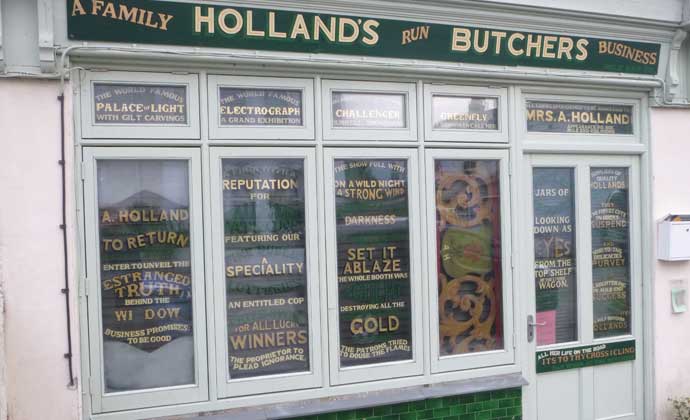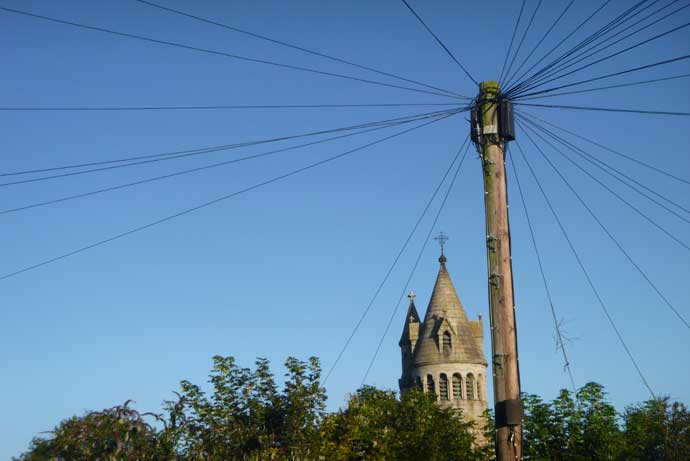If you’re in the present, the past is a crazy place. They did things weirdly differently there. If you’re reading this in 2029, or 2039, well, I’m sorry, but I couldn’t see further than 2019.
The moment – I mean the big moment, this point in history, not just 11.09 this sunny morning on Church Street, Falmouth, heading for The Moor – defines acceptable behaviour.
Our forefathers and foremothers would think us insane for doing things the way we do, and chances are, the next generation will look back on us as sadly unenlightened about what was happening in the world around us.
But we’d think them totally out of order if they turned up and told us how to behave, just as the Edwardians would have had difficulties with, I don’t know, the third week (say) of a modern gender-studies course. Today, at worst (old guy speaking here), we’d just go pink and sit at the back.
Boy, we believe in our own way of doing things. Girl, we do. Same down through history. The prevailing belief system is correct in its own time, incorrect twenty years later.
More than that – in its own time, the prevailing belief system can get to be nigh-on compulsory.
For example, whether or not the science is correct and we’re all gonna die, I’d say the social pressure (around here, at least) is now enough to ensure that a lot happens to tackle climate change. After all, only an outcast or the wrong kind of rebel would drink through a plastic straw these days.
I’d also have to say that the psychology of climate-change denial is probably no longer “I’ve looked at the science and I disagree with you” but instead “I’m a contrarian and I will disagree with anything you say.”
Which brings me to Extinction Rebellion. I have friends who went off and demonstrated recently, and that prompted me to find out enough to defend myself in the inevitable after-protest conversation.
Not that I’m a contrarian or anything, you understand, but with these friends, “You should have been there” can shade very quickly into “Why weren’t you there?” and then just possibly (if they’re tired after their exertions) “Don’t you care enough to be there?”
“I was busy” doesn’t work as an excuse. What’s more important than … et cetera.
“With friends like those, you need other friends.”
“Yeah, but I’m fond of them.”
“So why weren’t you there? Don’t you care enough?”
“Come on, Ed. Don’t you start.”
Edgalcius and I have come to Espressini on Killigrew Street for a coffee. He’s picked himself a pair of square tortoiseshell spectacle frames, and while I write he’s amusing himself by taking them off and putting them on again. Bifocals don’t exist in his world, and (I’m beginning to realise) nor does crystal-clear vision.
“Look at the grain in this table-top.”
“I’m trying to write about Extinction Rebellion. It’s a serious subject.”
“That tree out there. I can see the leaves, the branches.”
“Their demands.”
“It’s all so clear!”
Extinction Rebellion want the UK government to create and be led by a Citizens’ Assembly on climate and ecological justice (my bold type). Which is why I want to write about them. Think about recent UK-government efforts to decide anything. This isn’t a “declare that it’s horrible” demand, but “create a body that can make a decision,” which is a rare kind of realism these days.
“Yes, but what’s different about a Citizen’s Assembly?”
“As I was about to say.”
If you sort the population into quotas according to demographics, and then you select randomly from those quotas, you end up with an Assembly of Citizens that is more directly representative than, you know, at least one other body I could name.
“Ah, yes. And then - create and be led by. In bold. I get that part.”
“Citizens don’t have a political agenda. They can do the bit that politicians can’t.”
“Like holding a referendum, really.”
“Not quite. Citizens’ Assemblies have been used before, successfully.”
“So have–”
“They’re handy for sorting out controversial issues. A Citizens’ Assembly in Ireland dealt with same-sex marriage, and another achieved the repeal of the ban on abortion. There are other examples.”
“And that’s it?”
Extinction Rebellion also want the UK government to “tell the truth” by “declaring a climate and ecological emergency, working with other institutions to communicate the urgency for change” (although imagine a UK government that was competent enough to hold together a lie), and they want the UK government to “act now” to “halt biodiversity loss and reduce greenhouse gas emissions to net zero by 2025.”
This is Extinction Rebellion and not It’s All Fine Really, Honest Rebellion, so the truth is going to have to be pretty dire – see above re social pressure – although I think the manifesto does add somewhere (can’t find it now) that if the scientifically verified, openly disclosed truth does turn out to be less ghastly than expected, Extinction Rebellion – may I call you ER? – wouldn’t object.
I think I’ll join these people.
“Not like you, to get into politics.”
He’s reading over my shoulder again.
“It’s not politics, though, is it? ER wants a decision-making body capable of making decisions. That’s actually progress. Evolution, even.”
Edgalcius is tipping his head back to see my laptop screen through the lower part of his bifocals.
“So it’s not just the looming extinction of the planet.”
“Well, that too.”
“But really, you’re joining ER because they’ve come up with today’s equivalent of the coalition government that took over in 1940. A decision-making body capable of making decisions.”
“If we can’t move forward, by deciding what to do, we’re going to lose big-time anyway.”
“Speaking of moving forward…”
“That’s my line.”
“They’re loading up.”
A caravan of yaks and camels is forming just outside the (open) North Gate of the walled town. Princess Eustacia’s voice can be heard over the hubbub – “No, Mummy, I don’t need the Praetorian Guard! I’m going with my friends!” – and in the background, Roland’s voice too – “Of course I’ll wash my hands! Mother! Of course I’ll make conversation with her!”
Pipsqueak is defending his yak against servants trying to load it (her) with bundles of Princess Eustacia’s luggage. Myrtille has ridden a short distance up the road. They’ve been exchanging glances, sharing the joke of all this preparation, but Pipsqueak can tell that Myrtille is getting impatient.
[Ed is too. “Have you seen her tent? It’s going to take hours to pitch. And all those monogrammed bundles. They need to leave now if they’re going to unpack before dark, or they might as well wait for morning.”
“Ed. You’re imaginary. Don’t be difficult.”
“I’m imaginary. Ha!”]
Princess Eustacia comes galloping out of the crowd to where Myrtille is sitting on her yak.
“Can’t we just go?” she says. “Leave it all behind? Do I really need all this stuff?”
Myrtille eyes Princess Eustacia’s horse.
“Sunflower,” Eustacia snaps. “I didn’t name him. And call me Stace, okay?”
[“Ah, plot twist,” says Ed. “She’s feisty now.”]
Roland comes trotting up. “Princess–” he begins.
“Can it, Roly! We’re leaving. We can, right?” Stace turns to Eustacia.
“You’ve got–”
Stace grabs the strap of her rucksack. “Everything I need. Packed it myself this morning. All this” – she sweeps her hand around at all her other luggage, the yaks, the servants – “just anxious parents.”
Myrtille glances across to Pipsqueak. He’s heard. Their eyes meet as he slides a bag of thermal vests off the back of his yak and onto the ground. “Ready?” she says. It’s a challenge.
He grins. “Yeah.”
Stace has caught all this. She spurs her horse, taking them both by surprise, and disappears over the horizon.
“Go!” cries Myrtille, and her yak lumbers into motion.
“Yee-haaah!” shouts Pipsqueak, and his yak raises her head from the grass verge.
“I say! Hold on!” Roland, who has dismounted to pick a posy of wild flowers for the Princess, scrambles back into his saddle.
Together, the three of them ride slowly northwards in pursuit of the Princess formerly known as Eustacia.
And behind them, at the gate, the Queen raises her arm and points. “After them!” she shouts.
Further down the same page of search results you find “A digital identity is information stored online that relates to a single individual. We generate our own with every on-line interaction and the data that we leave behind builds a profile of us – which may not be an accurate representation.”
Which is – thanks for those definitions to techopedia.com and shu.ac.uk – not the only problem. All parents sooner or later realise that their children are learning more from what they do than from what they say. In the same way, all users of networked technology sooner or later realise that the entities to which they submit –
– it’s always submit isn’t it? You’re always submitting online, never commanding or controlling or just ordering people about –
– to which they submit their information are learning from what they do, not from what they write in their online profiles.
I went to a presentation recently, by a high-up retail person in a well-known business (and consumer) software company. The subject was how to combine a “seamless” customer experience with effective security.
How they can make sure that you’re you, without getting in the way of whatever you’re trying to do. [Nice idea, huh? They should try it.]
And I learned for the first time that companies can track your competence with the keyboard and the mouse. [Okay, I’m slow.]
I’ve given over a certain amount of information to my, ah, online suppliers. I buy vegetables from companies that know my date of birth, et cetera.
I know that those companies have access to a lot more data about me. I’ve signed user agreements that allow social-media companies to analyse how I behave and (for example) work out how I’m likely to vote. I don’t like it, but I realise that if I want to post pictures of cats, they need to know what I bought last Summer.
I didn’t realise that those same companies are now collecting data on how competent I am at typing, how slow I am to work out which button to click, et cetera.
They know that I’m a fast but not always accurate typist; that I sometimes hit the mouse pad with the heel of my hand when I’m going for numbers; that I always use the number [Redacted] and the symbol [Redacted] when I’m setting a new password.
And if they know how I get around my keyboard, it follows that they’re on the other side of the little inbuilt camera above the screen of my laptop. Cooee! I’m waving.
I’m not surprised by any of this. Nor am I outraged. But I do wonder.
Why isn’t my life perfect?
These people, they know my wants, needs and desires. Their whole preoccupation is with putting exactly the right thing in front of me, just at the moment when I want to buy it.
They’ve spent billions on knowing me.
Why don’t they know me?




